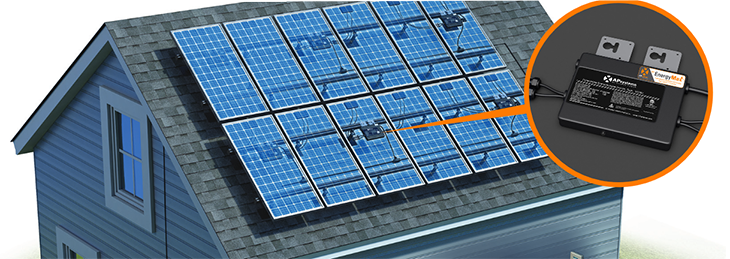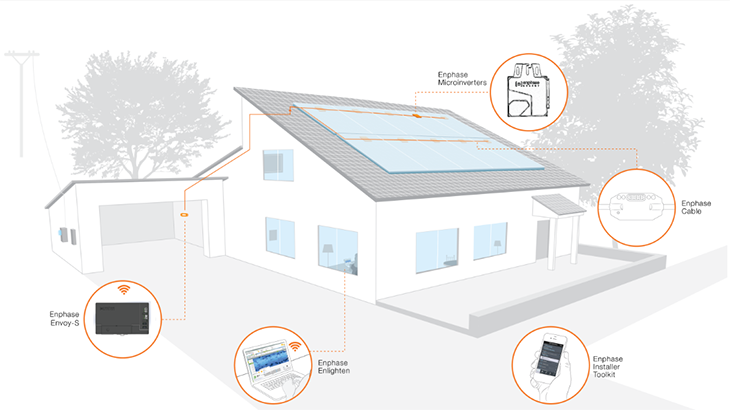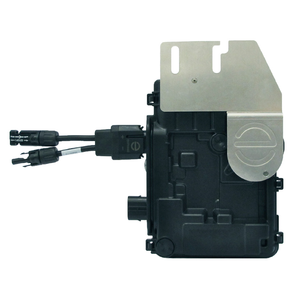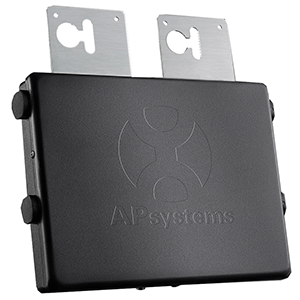 Loading... Please wait...
Loading... Please wait...Products
- Solar Panels
- Solar Panel Kits
- Solar Generators
- Inverters
- Inverter Monitoring
- Inverter Accessories
- Balance of Systems
- Racking and Mounting
- Rails
- Flashings
- Splice Kits
- Stopper Sleeves
- Conduit Mounts
- Attachments
- Brace Assembly
- Base Mount
- Brackets
- Bolts
- Clamps
- Caps
- L-Feet
- Washers
- Skirt
- Lugs
- Tilt Legs
- Hooks
- Stand-Offs
- Ballast Bay
- Top of Pole Mount
- Side of Pole Mount
- Flush Mount Kits
- Ground Mount Kits
- Roof Mount Kits
- Hardware Packages
- Wire Management
- Batteries
- Battery Accessories
- Charge Controllers
- Tools and Supplies
- View All Products
Solaris Blog - APsystems Microinverters
Enphase VS APsystems Microinverters
Posted by Brandi Casey on 13th Apr 2017
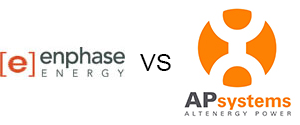
Microinverters offer a wide variety of benefits to home and
commercial solar arrays. They typically last longer than traditional string
inverters, ensure that each panel is working to their maximum efficiency, and
will continue working individually even if one of the panels in the system is
down or having less output due to environmental or electrical issues. A handful
of companies have begun offering microinverters for their respective brand, SMA
has released numerous microinverters of their own, however they are typically
taken off the market again after a short time. While they hope to produce a
long term microinverter product, the company that has always stood strong in
microinverter technology is Enphase Energy. To date, if one wanted to use
microinverters on their homes, they would, naturally, be pointed in the
company’s direction. A newer competitor has emerged from the company APsystems,
has been in business since 2009 and has steadily gained recognition in the
microinverter business.
*APsystems Installation Microinverters
While there are many similarities between the two companies
there are a few noticeable differences. The first being that APsystems YC500i
microinverters are designed to be installed on two panels while Enphase
microinverters are installed on each individual panel in your solar array. The
YC500i is approved to produce up to 548W of power, which is fairly advanced in
terms of inverter technology, currently Enphase’s IQ+ series has its highest
output power rated at 235-400W+ of power. That being said, in terms of
application, this means that YC500i microinverters can handle up to two 270W
solar panels and still meet its maximum output power. With solar panel
technology ever increasing to above 300W of power, it is safe to say that the
company will need to produce micoinverters with higher wattage output and input
power to remain to competitive. However, for solar arrays that utilize panels
270W and below, the convenience of using one microinverter per two panels may
be worth it. Using one microinverter for two panels will shorten installation
time, require less installation components such as trunk cables, and ultimately
save costs.
*Enphase Energy Microinverter Installation
For homeowners looking for the assurance of a long-term
partner, Enphase may seem like the safer bet because it is more well known.
However, the company has only been in business 3 years longer than APsystems,
given the fact that microinverter technology is relatively new to the solar
industry, the extent of the companies’ time in business may not be the best
indication of a long-term partner. Those in the solar industry typically look
out to the future to see new possibilities for the manufacturer and whispers of
new product lines. Enphase to date has been fairly consistent in releasing new
series and increasing their technology. As previously mentioned, they recently
released the IQ and IQ+ series and are currently working on releasing their
full line of batteries. Prior to this series, they were popular for their M215
and M250 series microinverters, which lead to the S series which has an S230
and S280 microinverter. APsystems releases updates to their products, but at
the moment at a slower rate than Enphase, however, their technology is growing
and they certainly have nowhere to look but up looking forward, and their
unique installation process will serve them well in terms of remaining more
cost competitive with traditional string inverter systems than Enphase.
*Enphase Energy IQ+ Microinverter
Ultimately, both manufacturers are strong and backed by
cutting edge technology. Homeowner and business preferences in installation and
cost are what truly separate the two manufacturers. We would be interested in
seeing more cost competitive products from Enphase, and more flexibility in
output power from APsystems. Watching their past and predicted future trends,
both companies seem to be rising to the occasion and may out pace string
inverters in the future due to their cutting edge technology and decreasing
prices.
*APsystems YC500i Microinverter


